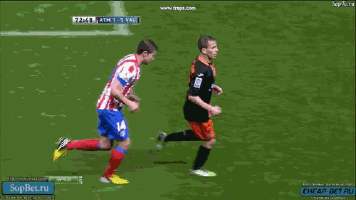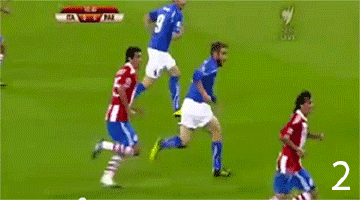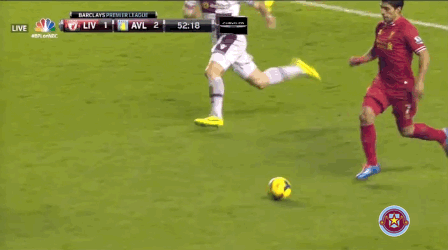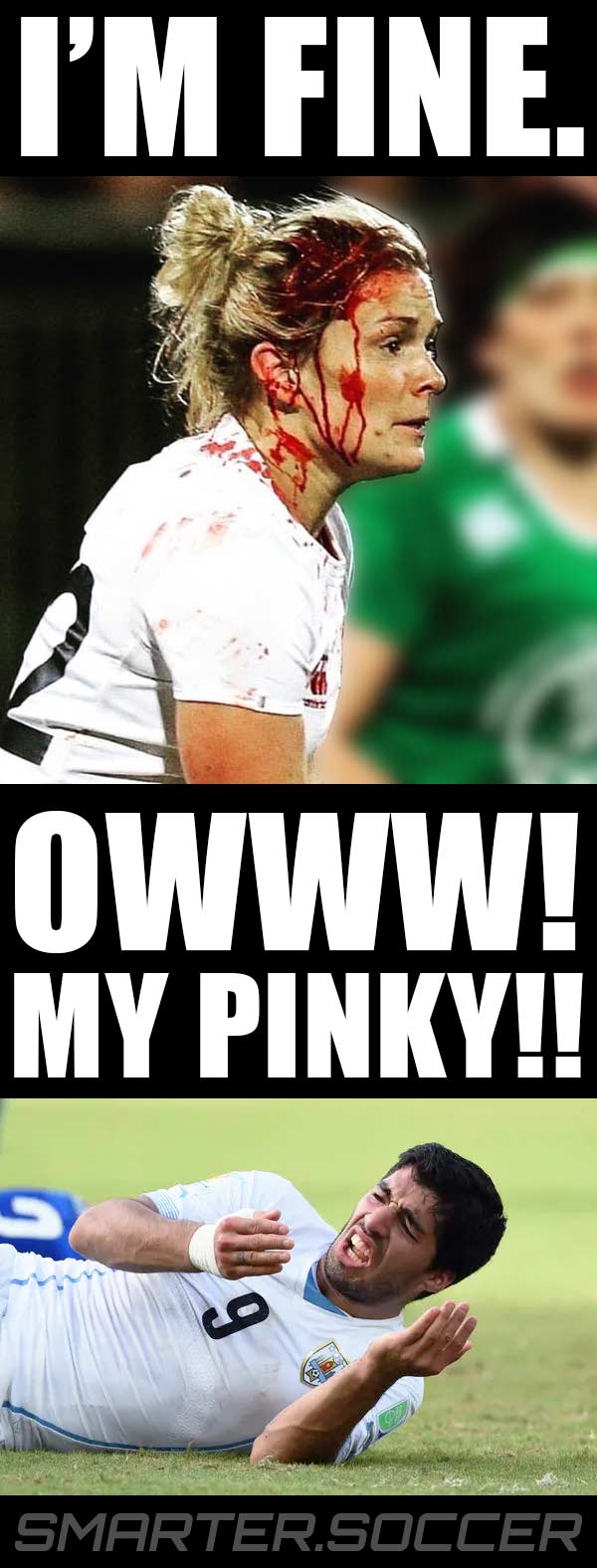PENALTY KICKS
➤ To Dive Or Not To Dive…That Is The Question.
In your playing career, the subject of “drawing penalty kicks” will inevitably come up. Either by your coach, your teammates or even your parents. You will then be faced with a personal dilemma: do you deliberately try to “go down in the box” to get a penalty kick decision from the referee?
Since soccer is traditionally a low-scoring game, a penalty kick can be the difference between winning and losing. For just this reason, referees hate awarding penalty kicks. Some refs are so intimidated for getting the call wrong that they are hesitant to call a penalty even for the most flagrant foul, which is why some players become adapt at “flopping” — or theatrically falling to the ground in an effort to make it easy for the referee to call a penalty.

Law 14:
The Penalty Kick.
Definition: A penalty kick is a direct kick taken from the penalty spot (12 yards from goal) with only the goalkeeper defending.
“And the Oscar For Best Actor Goes To…”



➤ Simulation
Flopping, or diving, has gotten so bad that soccer’s governing bodies created a new foul category called “simulation.” Whoever came up with that tender word to describe falling to the ground like someone just sliced you in half with a samurai sword, should be saluted. The problem is that this criteria didn’t do the referee any favors, aside from giving them a “get out of jail free card” if they don’t want to award a penalty. It’s far easier to accuse a player of “simulation” and give him or her a yellow card, then award a penalty kick and change the outcome of a game.
One of the more interesting aspects of flopping is that it’s mostly a male phenomenon. That’s right. Diving is quite rare in the Women’s game. In fact, it’s frowned upon. A female player is more likely to soldier on trying to stay on her feet after being ruthlessly hacked, rather than going down and most likely getting a penalty called. It’s valiant, and it’s this hero mentality that can make the women’s game so compelling, especially when some male players (we won’t mention any names – Neymar) go down writhing in pain after being lightly brushed by another player. While this courageous mentality is commendable, the question a female player should ask is: will staying on my feet actually be the best choice?

The reality is that after being clobbered it will take considerable effort — and time — to stay upright, which will prohibit you from taking a quality shot on goal. So should you go down? The problem is that if you don’t go down, a referee will not blow their whistle. Remember, a referee will do anything to NOT call a penalty, so by staying upright and forging ahead, you end up making the call for them. Thus, if you’re truly fouled, just go down. But here’s where dumb soccer players screw up. They make a grand display of going down. There’s no need to ham it up. Just fall down naturally, and if the referee has integrity, he/she will make the right call.
Now if you’re male, things can get a little dicey. Some coaching believe “diving” is “part of the game” and encourage players to do it. Other coaches are staunchly against it and would rather lose a game with honor, than ask his players to dive and receive a penalty they don’t deserve. Smarter Soccer’s position is for males to adopt the female philosophy: if you truly get fouled, just go down. Again, there is no reason to give an Academy Award winning performance. The more “drama” you add to the fall, the more it’s going to look like your faking it, and the more likely you can get the “Simulation” Yellow Card.
➤ What If The Referee Doesn’t Call A Penalty?
After going down, some players stop playing and look back at the referee when they don’t immediately hear a whistle. Do you think you’re going to get a call from a ref if you’re looking at them with venom or like they’re the biggest idiotic in the world? Most likely, no. A quick, questioning look will suffice. The visual message should be: “I believe I got fouled, don’t you?” If the answer is no, then GET ON WITH IT! There’s no use languishing on the ground. In fact, if the goalie hasn’t scooped up the ball, it’s probably still in play and you may even get a second scoring opportunity. But not if you’re pounding your fists and kicking your feet against the ground. And that doesn’t mean losing your cool and going after the opponent with a two-footed tackle that gets YOU in trouble. Just see if you can make a play.
Later on, if you happen to be next to the ref, you can say something like this in a respectful manner: “I think you missed that one.” He/she may respond or they may not. The important thing is not to answer. You made your point. No need to get into a prolonged argument. Just put the whole thing behind you and keep playing. If you do it in a nice manner, the ref may see that you’re sincere, question their own decision, and you may get a call down the line. If you’re nasty, then the referee will be more than satisfied he/she didn’t give it to “some jerk.” Therefore, be smart about it.
‶Simulation″
Definition: According to FIFA’s Laws of the Game, “attempts to deceive the referee by feigning injury or pretending to have been fouled,” also known commonly as Simulation, must be sanctioned as unsporting behavior and are punishable by a yellow card.

P.01
Diving: It’s Part Of The Game
But, is it part of YOUR game?
Ultimately, that’s the question you’re going to have to answer yourself. Neymar spent countless minutes writhing around on the ground during the last World Cup faking injuries. Do you think it helped or hurt his reputation?
➔ That’s right, it hurt. He looked like a chump. Many people ridiculed him by posting YouTube videos of him rolling around screaming in pain, as if someone just amputated his leg. Is this who YOU are?
★ Smarter.Soccer Insight: Play soccer with integrity and honor. Even if you lose, you’ll feel a lot better about yourself.
To Flop Or Not To Flop For A Penalty Kick
To Flop Or Not To Flop For A Penalty Kick
Do you think Neymar’s dishonorable display at the 2018 World Cup helped or hurt his reputation?
Trackbacks/Pingbacks